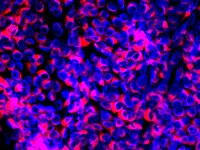
Photo from wikipedia
Bovine viral diarrhea virus (BVDV) is a critical animal pathogen that leads to cattle production losses associated with acute disease, immune dysregulation, reproductive failure, and respiratory disease. Due to the… Click to show full abstract
Bovine viral diarrhea virus (BVDV) is a critical animal pathogen that leads to cattle production losses associated with acute disease, immune dysregulation, reproductive failure, and respiratory disease. Due to the monotonous control technique and neglect of BVDV, increasing prevalence of BVDV has caused significant economic losses in the cattle industry worldwide. Therefore, novel anti-BVDV drugs are essential to prevent and control BVDV. Our previous studies have found that Forsythoside A (FTA) could inhibit the replication of BVDV via TRAF2-dependent CD28-4-1BB signaling in bovine peripheral blood mononuclear cells (PBMCs), but whether they can directly inhibit the BVDV remains unclear. Here, we further investigated the effects of FTA on BVDV and its underlying mechanisms of action. We found that FTA significantly inhibited the replication of BVDV in the MDBK cell directly. The results demonstrated that FTA could reduce the functional activation of Caspase-1 to inhibit the inflammatory response caused by BVDV infection and increase the expression of type I interferon (IFN-I) to clear the virus in vitro. The animal experiment was performed to evaluate the antiviral effect of FTA in vivo. Notably, after challenged with BVDV, mice with FTA + Erns-E2 protein displayed alleviated pathological damage and decreased the viral load in the spleen compared with mice inoculated with Erns-E2 protein. Furthermore, treatment with FTA enhanced body defense and delayed infection by the BVDV. Our results reveal that FTA suppresses BVDV replication both in vitro and in vivo and therefore shows promise as an anti-BVDV agent.
Journal Title: International Journal of Molecular Sciences
Year Published: 2022
Link to full text (if available)
Share on Social Media: Sign Up to like & get
recommendations!